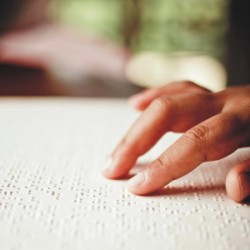Human Rights Monitor
 The rights of blind people
The rights of blind people
Khan Ferdousour Rahman
Nowhere in present world, discrimination on the ground of disability is acceptable in law. Discrimination means treating a person less favourably because of his or her disability. Prejudice (intolerance or discrimination against a person or group) leads people to think that a blind person will always be less effective than his sighted counterpart, which is in fact not being founded on reason. With the invention of Braille many blind people were able to express themselves.
Globally many developments occurred in order to help the blind. One of the major occurrences was passing laws to protect them and give them rights as individuals. The major law prohibits discrimination on the basis of disability including blindness. Equal rights and special care for people with disability (PWD) is recognized by various international and national instruments.
Disability issue is addressed in article 25 of the Universal Declaration of Human Rights (UDHR) of 1948. The UDHR is valid for all PWDs have nevertheless often been disregarded. The International Labor Organization (ILO) Convention concerning Vocational Rehabilitation and Employment of Disabled Persons 1983 is also in the favor of PWDs. The UN Convention on the Rights of the Child (UNCRC) 1989 clearly mentions the rights of the children with disabilities. The UNESCO Salamanca Statement (Education for All) 1994 also supports the PWDs. The UN declared 1981 as the International Year of Disabled People, first step in raising global awareness about PWD and some of the issues they were facing. The adoption of the UN Standard Rules on the Equalization of Opportunities for PWDs in 1993 was the first instrument that spells out the responsibility of state in the process of equalization of opportunities of PWDs in all spheres of society. This convention includes an article regarding participation in cultural life, recreation, leisure and sports. These rules are not legally binding for states, but offer a basis for policy making.
World Bank's commitment of various multilateral bilateral donors, attempts have been taken to address the disability issue in mainstreaming development planning and programming. The UN Convention on the Rights of the People with Disabilities (UNCRPD) 2006 is the first human rights treaty of the new millennium that marks a paradigm shift in attitudes and approaches to PWDs. The UN formally agreed on the UNCRPD with total 50 articles during the 61st session of the General Assembly on December 13, 2006. It introduces new obligations to overcome cultural, legal, economic and physical barriers and introduces measures, which ensure that PWDs are acknowledged as subjects with rights entitled to respect on an equal footing with all other people. An 18-article Optional Protocol on communications allows individuals and groups to petition to the committee once all national recourse procedures have been exhausted. The UNCRPD and its Optional Protocol, legally binding instruments which set out the legal obligations of States to promote and protect the rights of PWDs, which entered into force on May 03, 2008. Every year 3rd December is observed as International Day for PWDs, which is a time to make a renewed commitment to the principles of dignity and justice for the ratification and full implementation of the UNCRPD and its Optional Protocol.
In Bangladesh the national framework for disabilities in the Constitution states “no citizen shall, on grounds only of religion, race, caste, sex, or place of birth be subjected to any disability, liability, restriction or condition with regard to access to any place of public entertainment, or resort, or admission to any educational institution.” This Constitution, in various sections have stressed on the issue, e.g. Article 28(3) and 29(3)(a). The government introduced disability policy in 1997 and enacted the Disability Welfare Act in 2001 to provide a legal framework for the development of PWDs in the country. In light of this act, a national action plan was formed in 2002 and it was accepted by the competent authority in 2006. After enacting this Act, the rights of people with disabilities received a legal base in Bangladesh. The issues of disability have also been included recently in the school text book at primary and secondary levels under national curriculum.
 |
Photo: sciencedaily |
Bangladesh has signed the UNCRPD on May 09, 2007 and ratified it on November 30, 2007. Bangladesh is the 8th member state of the UN, the 1st member state of OIC, the 2nd member state of SAARC, and the 3rd member state of Commonwealth ratified the UNCRPD to promote, protect and fulfill the rights and dignity of PWDs. The Government has also ratified the Optional Protocol of the Convention on May 12, 2008.
'Vision 2020' the 'Right to Sight' programs, launched by World Health Organization (WHO) in 1999 together with more than 20 international NGOs involved on eye-care including prevention and management of blindness, is a global initiative that aims to eliminate avoidable blindness by the year 2020. This initiative seeks to raise awareness, mobilize resources and develop national blindness prevention programs with governments to prevent an additional 100 million people from becoming blind. The 'Right to Sight' programs address blindness in children as a major public health priority. Bangladesh ratified 'Vision 2020' in 2000. The country has prepared the 'National Eye Care Plan' under the leadership of the Bangladesh Council for the Blind, an apex body under the Ministry of Health and Family Planning, for implementation of 'Vision 2020'.
The medical model of disability identified and treated blindness as defects, whereas the social model aims to assert the rights of those with impairments to participate in society. However, the vested quarter of the society seem to be more concerned about the welfare of the PWDs rather than establishing their rights. Under such circumstances Bangladesh Disability Welfare Act was enacted in 2001. This is basically a paper-based law, where there is no provision of accountability. There is no mention of women with disabilities in the act. The issues like education, employment, health service, transportation, cultural aspects and social security along with constitution recognized rights are included in the schedule instead of the main text; as a result the importance of the law has been undermined.
For the overall betterment of the PWDs, right-based approach is more important than the welfare-based approach. The MDG will not be achieved if PWDs are not included in the mainstream development plan. The successive governments merely gave assurance rather than implementing the convention to ensure the rights of the PWDs. The present government also mentioned in their election manifesto to update and revise the existing disability welfare act. However, forming a law is not enough unless it is implemented with strict monitoring which requires political commitment.
The writer is a freelancer.